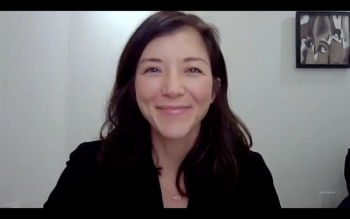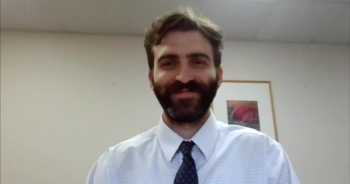
Robert Rifkin, MD, FACP, a medical oncologist and hematologist at Rocky Mountain Cancer Centers, outlines the importance of studying treatment resistant patients with multiple myeloma.

Robert Rifkin, MD, FACP, a medical oncologist and hematologist at Rocky Mountain Cancer Centers, outlines the importance of studying treatment resistant patients with multiple myeloma.

The Fraser guidelines can indicate if a child is fully competent to make their own decisions, including consenting to HIV tests if they may be at risk, explained Amanda Ely, CEO of the Children’s HIV Association (CHIVA) of the United Kingdom and Ireland.

James Auran, MD, a professor of ophthalmology at Columbia University Irving Medical Center and president of the American Society of Ophthalmic Trauma, discusses how a lack of providers has created a crisis in the United States.

Behavioral cough therapy should be used as early intervention, said Laurie Slovarp, PhD, CCC-SLP, associate professor in the School of Speech, Language, Hearing, and Occupational Sciences at University of Montana.

Michael Thorpy, MD, director, Sleep-Wake Disorders Center, Montefiore, and professor of neurology, Albert Einstein College of Medicine, discusses treatment implications for clinicians managing chronic insomnia and potential comorbid conditions.

Adriaan Voors, MD, professor of cardiology and director of the Heart Failure Clinic, University Medical Center Groningen, the Netherlands, explains why patients provided sodium-glucose co-transporter 2 (SGLT2) inhibitors in hospitals may be unable to continue the medication after discharge.

David R. Stukus, MD, FACAAI, of Nationwide Children's Hospital and The Ohio State University College of Medicine, and a board member of the American College of Allergy, Asthma & Immunology, speaks on the difficulties of gaining coverage for newer biologic therapies in the treatment of atopic dermatitis.

HIV specialist dieticians at this London-based charity help people with HIV by providing personalized advice on how nutrition can have a positive effect on their overall health and well-being.

Anne Barmettler, MD, an associate professor of ophthalmology, visual sciences, and plastic surgery at Montefiore Medical Center, discusses the cost of teprotumumab for thyroid eye disease.

David Yeomans, PhD, associate professor of anesthesiology, perioperative, and pain medicine at Stanford University School of Medicine, discusses the potential therapeutic use of intranasal oxytocin spray for menstrual-related migraine.

Most people are aware of what triggers their chronic cough and how to temporarily suppress it, said Laurie Slovarp, PhD, CCC-SLP, associate professor in the School of Speech, Language, Hearing, and Occupational Sciences at University of Montana.

Adriaan Voors, MD, University Medical Center Groningen, the Netherlands, discusses how and why sodium-glucose co-transporter 2 (SGLT2) inhibitors act so quickly for patients with heart failure.

When a flu season is mild, it can make developing a vaccine for the following season a bit more difficult as it can be hard to find the right match, but on the other hand, the US health system could benefit from less stress this winter given the unrelenting demands posed by COVID-19, says Leslie Kantor, PhD, MPH, chair and professor of the Department of Urban-Global Public Health, Rutgers School of Public Health.

Daniel Greer, PharmD, BCPP, clinical assistant professor, Rutgers Ernest Mario School of Pharmacy, speaks on how capabilities of cognitive behavioral therapy have evolved to a more user-friendly approach in the management of chronic insomnia.

Robert J. Hopkin, MD, clinical geneticist, Cincinnati Children's Hospital Medical Center, provides an overview of the evolving treatment landscape in Fabry disease.

David R. Stukus, MD, FACAAI, of Nationwide Children's Hospital and The Ohio State University College of Medicine, and a board member of the American College of Allergy, Asthma & Immunology, discusses efforts to align novel treatments for atopic dermatitis with patients based on the underlying mechanisms of disease.

Next Gen ACO recently re-branded as the Value Based Care Coalition. To learn more about the organization's new phase, we spoke with executive director Mara McDermott.

John Burke, MD, hematologist, Rocky Mountain Cancer Centers, discussed findings of the late-breaking abstract session POLARIX presented at ASH 2021, which compared pola-R-CHP with standard-of-care R-CHOP in patients with previously untreated DLBCL.

David Yeomans, PhD, associate professor of anesthesiology, perioperative, and pain medicine at Stanford University School of Medicine, outlines potential mechanisms underlying menstrual-related migraine.

Frederick Locke, MD, vice chair, Department of Blood and Marrow Transplant and Cellular Immunotherapy Program, co-leader, Immuno-Oncology, Moffitt Cancer Center, discusses findings of the phase 3 ZUMA-7 trial presented at ASH 2021 and how use of axicabtagene ciloleucel can be optimally applied in a real-world setting.

Sattva S. Neelapu, MD, professor and deputy department chair in the Department of Lymphoma/Myeloma in the Division of Cancer Medicine at the University of Texas MD Anderson Cancer Center, discusses findings of the ZUMA-12 study examining axicabtagene ciloleucel (axi-cel) as a first-line treatment option for high-risk patients with large B-cell lymphoma.

Leon Herndon Jr, MD, a glaucoma specialist, ophthalmologist, and professor of ophthalmology at the Duke University Eye Center, explains certain considerations ophthalmologists may need to take into account when treating older patients and the need for more specialists to meet clinical demand.

Mark Wildgust, PhD, vice president, Global Medical Affairs, Oncology, Janssen, speaks on progression-free survival, complete response, and overall survival benefits observed with ciltacabtagene autoleucel (cilta-cel) in CARTITUDE-1 and other studies presented at the 63rd Annual American Society of Hematology Meeting and Exposition.

Lori Muffly, MD, associate professor of medicine, Blood & Marrow Transplantation, Stanford University, discusses findings of her study showing disparities in clinical trial enrollment and patient outcomes for at-risk pediatric minority populations with acute lymphoblastic leukemia (ALL).

Andre Goy, MD, MS, chairman and executive director of the John Theurer Cancer Center, speaks on molecular features of diffuse large B-cell lymphoma and how this explains differences in patient response for chemotherapy and chimeric antigen receptor (CAR) T-cell therapy.

Constantine S. Tam, MBBS, MD, consulting hematologist and associate professor, Peter MacCallum Cancer Centre, discusses the superior safety and progression-free survival outcomes from the SEQUOIA phase 3 trial, which compared zanubrutinib with bendamustine and rituximab combination therapy in treatment-naive chronic lymphocytic leukemia/small lymphocytic lymphoma.

Chronic cough can be very debilitating to a patient's quality of life, explained Laurie Slovarp, PhD, CCC-SLP, associate professor in the School of Speech, Language, Hearing, and Occupational Sciences at University of Montana.

L. Elizabeth Budde, MD, PhD, oncologist and associate professor at City of Hope, discusses the use of mosunetuzumab in patients with relapsed/refractory follicular lymphoma (R/R FL) who have received 2 or more prior lines of therapy and addresses potential cost-related implications of the drug compared with CAR T-cell therapy.

Kimberly Westrich, MA, vice president of health services research at the National Pharmaceutical Council, speaks on common misconceptions when designing value-based benefits.

Theresa Juday, RPh, director, Specialty Product Development, CVS Health, discusses the indirect and direct cost burden associated with chronic insomnia.

259 Prospect Plains Rd, Bldg H
Cranbury, NJ 08512
© 2025 MJH Life Sciences®
All rights reserved.
